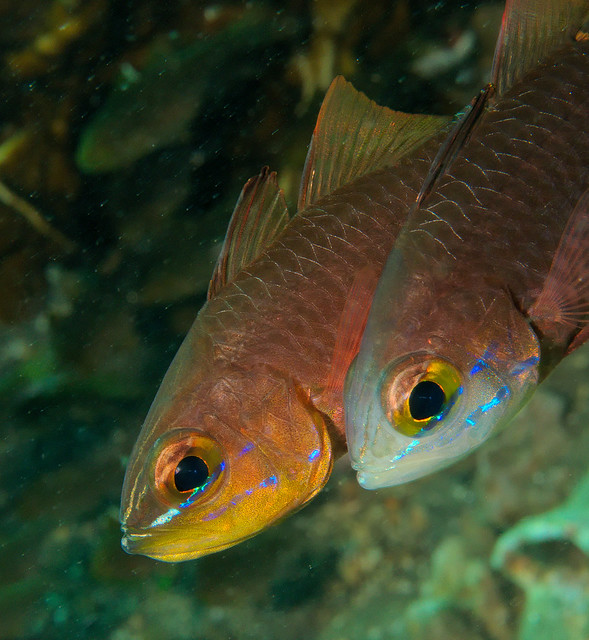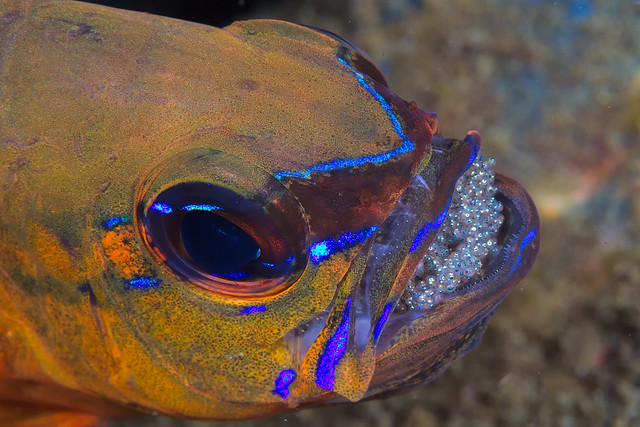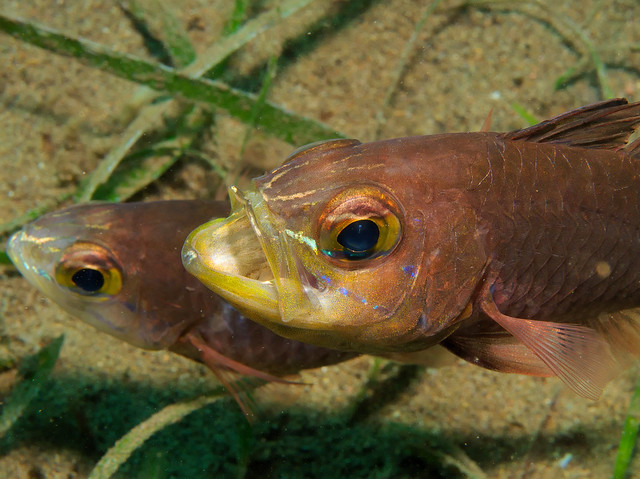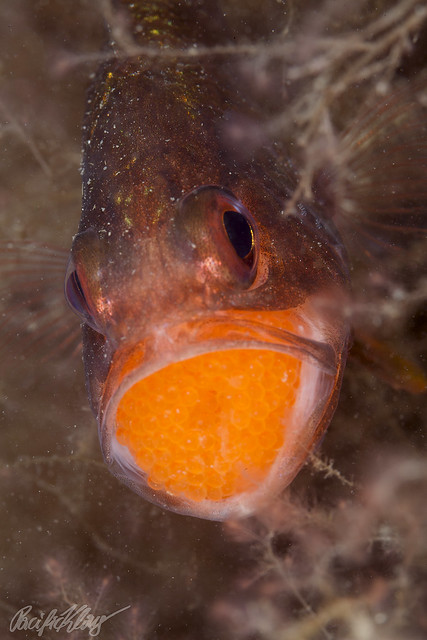An Orgy of Cardinals
Last weekend, my friends Carol, Marc and Eric and I went diving in Dauin, on the southeastern tip of the Philippine island of Negros. We had a really nice dive, and after about an hour we came back to the shallow part of the sandy slope at about 6 meters. There, next to the block to which our dive boat was moored, was a large rock – about the size of a car – with soft corals growing on its side, crinoids perched on top, and some sponges growing off the sides. Around the big rock we saw maybe 40 or 50 couples of small fish – my guess is that they measured around 15 centimeters each. The pairs would hover together above the sand, and rub themselves against each other for a few seconds, about once a minute or so. The male fishes – these are the ones with the bigger jaws – would sometimes open their mouths widely for a few seconds, as if to beg for something to go in there. Either rubbing or mouth-gaping was going on all the time, for roughly 15 minutes at the end of our dive. And the fish were so occupied with their aktschn that they did not particularly mind us divers and photographers getting close.
We witnessed a real orgy of cardinal fish!
What we observed was mouth brooding by these fish: The couples would mate, the female externalizing the eggs and the male fertilizing them, and the male then would then take the fertilized eggs into his mouth. This is a very good idea, if you are a fish living in a densely populated tropical ocean, with lots and lots of generalists and fish egg predators who would not hesitate for a second to feast on your brood. Keeping their eggs in their mouths conveys the fish embryos a huge advantage; they are much less likely to be eaten.
And since mouth brooding is such a good idea, it has evolved several time in fishes, in at least eight different fish families. Other mouth brooders known to the diver of tropical waters are the jaw fishes. Freshwater fished do that, too: Bonytongues (popular in the fish tanks of Chinese restaurants), Cichlids (popular freshwater aquarium fishes from the great rift lakes in Africa) and two families of catfish are other examples. Mouth brooding in cichlids is rather well researched.
In lake Tanganyika in Africa there is even a parasitic catfish which takes advantage of this kind of behavior. It eats the eggs of mouth-brooding cichlids just as the female releases them (before the male can gobble them up) and then gets the male cichlid of protect catfish eggs in its mouth! This fish works like a cuckoo, but does not take advantage of a nest made of twigs and leaves, but of the protective mouth of its host. Evil!
But even in the absence of such sneaky catfish, mouth breeding causes some problems to the dads (mostly) or moms and dads (in fewer fish species) with the fertilized eggs in their mouths. Eating and breathing are harder with a full mouth!
To see my point, check out this video of a goby breathing:
The little fish has to make a real effort to breathe, and it is only resting in the sand. Respiration is harder under water since water is denser than air (hence it takes more effort to move it over the gills) and contains less oxygen than air. With a mouth full of eggs, breathing is even harder, and oxygen depletion is a real threat to the mouth brooder.
Another issue is that with a mouth full of eggs, the fish dad can’t eat! So, sometimes the male fish eat the eggs, in an act of offspring-cannibalism. This happens more at the end of the breeding season, when the males are already worn out from fasting. Yeah, not cool, you might think, but these are fish, and we can’t apply human moral standards! (My “evil!” comment about the catfish, above, was a joke!). Interestingly, in some species of cardinal fish, the condition of the female degrades even more during breeding season, since they 1. need to produce eggs 2. defend their breeding territory against intruders.
What we saw that day was some impressive natural history. The fish we observed decided, over the course of their evolution, to trade breathing difficulties and temporary fasts for the increased safety of their offspring. The ocean never disappoints us nature aficionados.
References:
Balshine-Earn, S., Earn, D.J.D., 1998. On the evolutionary pathway of parental care in mouth–brooding cichlid fishes. Proceedings of the Royal Society of London B: Biological Sciences 265, 2217–2222.
Okuda, N., 2001. The costs of reproduction to males and females of a paternal mouthbrooding cardinalfish Apogon notatus. Journal of Fish Biology 58, 776–787.
Okuda, N., Yanagisawa, Y., 1996. Filial cannibalism by mouthbrooding males of the cardinal fish,Apogon doederleini, in relation to their physical condition. Environ Biol Fish 45, 397–404.
Ostlund-Nilsson, S., Nilsson, G.E., 2004. Breathing with a mouth full of eggs: respiratory consequences of mouthbrooding in cardinalfish. Proceedings of the Royal Society B: Biological Sciences 271, 1015.





